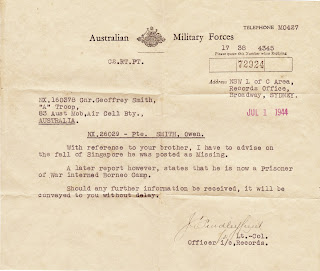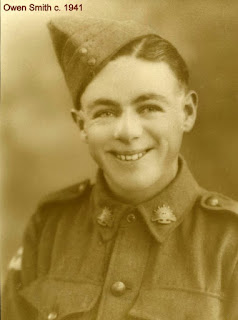The Short Life of Owen Smith
My Paternal Uncle, Private Owen Smith from Glen Innes, was a member of the 2/18 Battalion A.I.F. He was taken prisoner at the fall of Singapore in mid February 1942. After spending a few months at Changi, he was transported to Sandakan, Borneo. In a show of extraordinary will to live, Owen actually made it to the 110 mile peg, Ranau Jungle Camp 2 on the second (forced) march, but died the next day, on 27 June 1945.
The death of Uncle Owen deeply affected the dynamics of my family life - he was the only brother of my father. After Dad's passing, I found a letter from Owen that Dad had carried in his wallet for 64 years - very faint and barely readable. It was written in October 1941, before the fall of Singapore, sharing what his days were like and giving my Dad advice on how to conduct himself (at that time Dad was too young to join the forces and was in the Citizen's Militia).
Owen was the eldest of 5 children, born to William Thomas and Gertrude “Olive” Smith (nee Wotton) in Glen Innes in 1920. His siblings were Coral (1922-1934), who died of “chronic valvular disease”, my father Geoffrey (1923-2005), his sister Joan (1925-2004), and Nola (1926-1986), who was born intellectually disabled and needed institutional care her whole life. Their mother, Olive died in childbirth with Nola in 1926, leaving her young children motherless.
Their father William, was a drover, and often away from home. After their mother’s death, the children lived with their Grandmother, Agnes Jane Smith (nee Johnson), at Wentworth St. Glen Innes, until her death in 1933. After their Grandmother’s death, the 3 remaining children were split up, and sent to live with various Aunts and Uncles, who gave priority to their own brood of children during the difficult Depression years of 1929-1939. Money was scarce as they grew up, and life was hard, and winters cold, on the New England Tablelands. However the last straw came when their father passed away from a heart condition in 1938, leaving Owen, Geoff and Joan orphaned. Owen, as the eldest, took over the welfare of his brother and sister. Both brothers worked as farm labourers to help support themselves and Joan; schooling was not an option.
 When WWII broke out, Owen along with many other men from the New England area, was quick to join the 2/18 Battalion, who were recruiting in that area. Eventually Dad joined the AIF, and served in New Guinea and Southern Borneo.
When WWII broke out, Owen along with many other men from the New England area, was quick to join the 2/18 Battalion, who were recruiting in that area. Eventually Dad joined the AIF, and served in New Guinea and Southern Borneo. However he was not notified that Owen was listed as a POW until July 1944, although Owen’s army records have notations indicating that he was a known POW as early as April 1943. Dad was told of his death in September 1945 and was discharged from the AIF on compassionate grounds.
 It was in 1948 that he was finally informed by telegram that, according to Japanese POW records, Owen had died of Malaria. Malnutrition and exhaustion would have been a contributing factor. How he survived for so long under those atrocious conditions is any body’s guess, especially given the complaints he had written about, just being stationed in Malaya! In the end, only six men survived the years in Northern Borneo, by escaping and being cared for by local villagers.
It was in 1948 that he was finally informed by telegram that, according to Japanese POW records, Owen had died of Malaria. Malnutrition and exhaustion would have been a contributing factor. How he survived for so long under those atrocious conditions is any body’s guess, especially given the complaints he had written about, just being stationed in Malaya! In the end, only six men survived the years in Northern Borneo, by escaping and being cared for by local villagers. A provisional surrender by Japan was accepted on the 15th August 1945. The terms of this surrender included "...the prompt cessation of hostilities by the Japanese forces". These conditions were accepted by Emperor Hirohito who issued an Imperial receipt to the Allied Powers accepting these terms, It was reported in The Herald newspaper that "The Emperor undertook to to issue commands to the Japanese naval and air forces and all forces under their control, wherever they were located, to cease active operations and to surrender their arms...." The Japanese commanders in Borneo were aware of the surrender and its conditions, as 3 days later, the RAAF dropped leaflets over Ranau, informing these remote forces. However, no POW's were left alive at Ranau after this declaration. I believe the Japanese were hoping there would be no one left to tell of the atrocities inflicted upon the prisoners in their care, being unaware of the six escapees.
Those years must have been long and torturous for Dad and Auntie Joan; the not knowing, and full of worry. Along with the death of so many other family members, the death of Owen left Dad and his sister Joan totally alone and lost, with no real idea of what family life, as most know it, was like; with no one to guide or help them along life’s path.
Owen's official Army details are:
Pte. Owen Smith NX26029
Born: 3 February 1920 (Glen Innes, NSW)
Attested: Glen Innes Showground 1 June 1940
Enlisted: 14 June 1940 (Paddington, NSW)
2/18 Battalion B Coy.
Embarked on board HMT “Queen Mary” on 2 February 1941 Sydney
Disembarked Singapore 18 Feb. 1941
POW Changi, Singapore 16 February 1942
Transported to Sandakan 7 July 1942 aboard the Yubi Maru [B Force]
Arrived Sandakan Harbour on 18 July 1942
Was part of the Second Death March to Ranau
Died: 27 June 1945, Ranau, Number 2 Jungle Camp, Borneo
He is commemorated on the Labuan Memorial, Panel number 11
Many of the details of Owen’s life as a Japanese POW would never have been known except for the hard work and dedication of Lynette Silver, who as an historian has spent many, many years, dedicating her time to find out what really happened at Sandakan, the Death Marches and the camps at Ranau, as well as leading pilgrimages for family members each year.
Taken for the family by a participant at the 2002 Sandakan Anzac Day Memorial Service
Owen’s picture is first on right, bottom row
I have one other treasure from Owen which is in very poor condition, and that is the photo below.
On reverse of this “Carte Postale” is written:
“This is a snap of some of the boys from my Division [8th], and myself, not a very good one!
Owen"
There is no stamp to indicate date or place this was taken.
I think Owen is the first man on the left, kneeling down
Sometimes I feel that had those 2,428 men been saved, with the guidance of Owen to aid my Dad, my upbringing would have been very different, but we must accept things as they are and go on.
Although we can forgive, we must never forget the brutality these men suffered. We can but admire the bravery of all those soldiers who joined the Australian Military Forces in the name of God, King and Country or just for the adventure, but never expected their lives to be cut so short under such excruciating conditions.
Lest we forget
References:
Australian War Memorial Australian War Graves Commission
Lynette Ramsay Silver – Sandakan : a conspiracy of silence, 1998
Lynette Ramsay Silver – http://lynettesilver.com
NSW BDM Registry
Personal papers held by myself
The Herald; No. 21293, Melbourne, Wednesday Evening August 15, 1945





